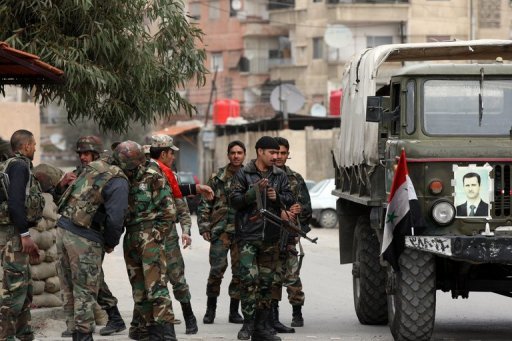
Syrian troops and rebels clashed on Sunday in the countryside of Damascus province and near the northern city of Aleppo, the Syrian Observatory for Human Rights reported.
Opposition fighters attacked regime forces overnight at a checkpoint in Damascus province near the border with Lebanon, the Britain-based watchdog said.
And in Aleppo, violent clashes broke out between the army and rebel forces in at least two villages, the monitoring group reported, without reporting casualties.
But a civilian was killed in shelling of Antareb, a town in Aleppo province near Idlib where rebel forces are concentrated. And another civilian was killed in bombing of Kafr Sita town in the central province of Hama.
In Douma, near the capital, activist and doctor Adnan Wehbeh was shot dead in front of his clinic, the observatory said, blaming security forces for what it said was an assassination.
The observatory also reported that a convoy of 45 tanks and armored vehicles transporting soldiers was seen heading east on the Palmyra-Deir Ezzor road.
In the northwest province of Ar-Raqqah, hundreds of people took part on Sunday in the funeral of a man killed the previous day in a bombardment of the town of Tabka, according to the group.
The observatory says as many as 2,400 of the more than 13,500 people killed in Syria since the uprising erupted in March 2011 have died since a UN-backed ceasefire began on 12 April.
Saudi Foreign Minister Saud al-Faisal accused Syria's President Bashar al-Assad of "maneuvering" to gain time, at a joint news conference Sunday with UN chief Ban Ki-moon.
"Every initiative has been accepted by the Syrian regime and was not implemented. This is a way used by the regime to gain time," Prince Saud told reporters in the Red Sea city of Jeddah.
"He is playing for time and maneuvering," he said referring to Assad.
The Saudi minister's remarks came immediately after Assad said Sunday that his government is faced with a foreign plot to destroy Syria.
Arab leaders on Saturday called on the United Nations to act to stop bloodshed that has persisted for nearly 15 months despite a UN-backed peace plan that includes the deployment of nearly 300 observers.
The plan was drawn up by UN-Arab League envoy Kofi Annan, who on Saturday singled out Assad and his regime as the key to resolving the conflict as he warned of the specter of all-out sectarian warfare.
Annan "will present his report [on Syria] in a few weeks … It must be clear, straightforward, precise and transparent," Prince Saud said. "We hope the United Nations takes a firm stance."
The Saudi foreign minister, who has repeatedly voiced his country's support for arming Syria's rebels, said: "We support creating a buffer zone in Syria which the oppressed can take refuge in … but this is the responsibility of the UN Security Council as the Arab League can't do this.
"The real solution lies in protecting the Syrian people from the harsh military," he said. "The people are unarmed whereas the regime receives weapons from several" countries.
"The situation is very dangerous. We hope things don't deteriorate further," he added.
Because of the worsening violence and Assad's failure to meet commitments under the agreed peace plan, the United States has warned that it may not agree to renew the UN observer mission when its mandate expires on 20 July.
Meanwhile, Turkish Prime Minister Recep Tayyip Erdogan on Sunday accused his one-time ally Assad of autocratic behavior, saying that such an approach would not serve peace.
"So far, I haven't seen him approach reforms with a democratic understanding. He is still approaching issues with … an autocratic approach," Erdogan told reporters in televised remarks.
"I believe that it is very hard to achieve peace in Syria as long as this approach continues," he added.
Erdogan's remarks came after Assad praised a 7 May parliamentary election in Syria as the ideal response "to the criminal killers and those who finance them" in his first address to the assembly on Sunday.
Erdogan said the election "cannot be considered fair in parliamentary systems in the modern world," pointing to the Syrian opposition boycott.
Turkey, once a strong ally of Syria, broke with Damascus after Assad's regime began cracking down on dissent in March last year.
Last week, Turkey ordered Syrian diplomats at their embassy in Ankara to leave the country following the massacre of more than 100 civilians in Houla which has triggered global outrage.
This story is a compilation of wires from AFP




